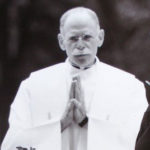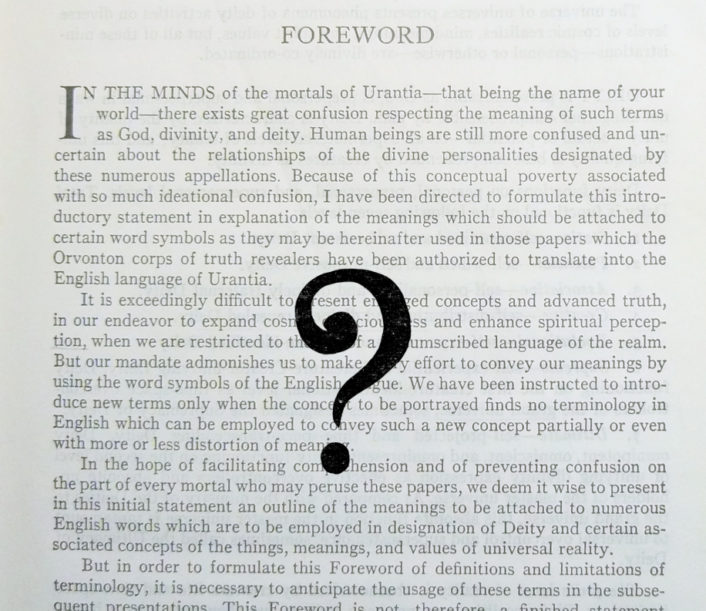Part I

Back in high school, I would have been voted “Most Likely to Volunteer for Alien Abduction.” Thus, I was immediately intrigued by a magazine ad I saw in 2009 for something called The Urantia Book.
The offer was for not just one, but two copies of the book, one indexed and the other not, and they were free. What could I lose? Of course, there was the possibility that along with the books would come a few survivalists to whisk me off to a commune in Idaho where I would be forced to hoard water, guns, and apocalypse-proof tins of food, but I suspected that if anyone actually did show up with my books, “he” or “she” would have come from somewhere a bit beyond Idaho. So, I took the plunge and went to the website pitching the book.
Soon a box arrived containing two copies of The Urantia Book. The unindexed version clocked in at 2,097 pages; the indexed version, set in a two-column format, covered 1,814 pages, followed by a 312-page Index. As a result, despite the tissue-thin paper, each volume must have weighed several pounds; not exactly light reading in every sense of the word.
I studied the front matter and the dust jackets and decided to read the indexed version. Maybe I thought the two-column format would go faster—hah!—or that it would be great to have an index—an invaluable asset indeed, as it turned out—but it was really the back of the dust jacket that sold me on this particular volume, despite the promise that the text within the two books was identical.
“The Urantia Book,” I was informed, “presents comprehensive answers to age-old questions about the nature and personality of God, the life and teachings of Jesus, the relationship between science and religion, spiritual living and much more. It provides detailed descriptions of a vast universe containing millions of worlds… inhabited by a host of diverse celestial personalities, both human and superhuman.”
Even better, I learned, “After this life you continue your spiritual journey of growth and adventure, passing through the many higher worlds of the universe until, in the distant future, you arrive on Paradise, outside of space and time at the geographic center of infinity.” (I did wonder, though: how can infinity have a center if it is, uh, well, infinite? I am still stumped by this question.)
Even better than that, I read, “Many are convinced that [The Urantia Book] is a genuine revelation, but only personal experience can validate that claim. Explore The Urantia Book and decide for yourself.” I was hooked.
Part II
Way back in 1989, I participated in a week-long residential seminar at The Monroe Institute in Faber, Virginia. Founded by Robert Monroe, the institute was created to explore expanded states of consciousness using a technology called Hemi-Sync.
Bob Monroe was still alive then and spoke to our group one night. Several times during his presentation he reiterated, “This is not a dogma. This is not a philosophy.” Then, echoing the back cover of The Urantia Book, he added, “Go out and explore for yourself.” Suddenly, twenty years later, I was being presented with a similar opportunity, a gift of unlimited potential, another vehicle—short of my own spaceship—whereby I could go out and explore and decide for myself. I turned to the Foreword and started reading.
I don’t remember how much later I first met other readers, but at some point, I started to look for other Urantians just as in the late ‘80’s I looked for other students of A Course in Miracles. Sure enough, Urantia Book study groups and contact information popped up and there were several people offering a connection.
I exhaled, relieved that I was not crazy. I was not the only one who bought this book hook, line, and sinker, as I continually marveled at its voice of authenticity. But I was a long way from being able to distinguish a Life Carrier from a Solitary Messenger from a Brilliant Evening Star. In fact, my honeymoon was over. I was overwhelmed by the new vocabulary. Morontia. Supernal. Absonite. Havona.
The real issue, I think, the larger truth, was that I was overwhelmed by the enormity of what I was holding in my hands. Even though I already had a long-standing meditation practice—God and I were really tight by then—this book that had fallen out of the sky scared the @#*&% out of me.
Another reader suggested that I start in the back, as many people do, with Part IV: The Life and Teachings of Jesus. Certainly, no less significant than any other part, these papers nevertheless are like breezing through a novel compared to the dense, difficult, and intricate technical writing of the preceding sections.
But there was a part of me that did not want to violate the integrity of the text this way, or rather the integrity of the process of the revelation. And so true to my Virgo nature—astrology’s status as a “superstitious belief” (121:5.5) notwithstanding—I returned to the Foreword, determined to read The Urantia Book straight through.
I brought to this effort considerable preparation, I thought: a search for God that began in earnest in 1979 when I learned to meditate, taking me, first, from the nominal Judaism into which I was born to Buddhism, then to A Course in Miracles, and finally to Christianity, initially to the Quakers, then to the Episcopal Church in which I was baptized and confirmed, and on to ordination as a (non-Roman) Catholic priest within the ISM, or Independent Sacramental Movement.
In addition, I was a certified Reiki Master. I had two quite spontaneous out-of-body experiences under my belt. I had read The Infinite Way, Conscious Union with God and almost everything else Joel Goldsmith ever wrote. I read Mary Baker Eddy’s Science and Health from cover to cover. I read M. Scott Peck. I read countless books about healing, the chakras, and the afterlife. I meditated. I practiced yoga. I became a vegetarian and then a vegan. I prayed. I met Jesus at daily mass. And I stumbled upon holosync, a technology similar to the Monroe Institute’s hemi-sync (See www.centerpointe.com).
What I did not bring to my first reading of The Urantia Book was even the most elementary understanding of any of the natural sciences. Although as a child I was very interested in astronomy, it quickly became a mathematical maze, light years beyond the basic arithmetic over which I can still stumble. Later, high school biology and an introductory college course in geology allowed me to graduate having met, barely, in each case, the absolute minimum requirement.
Chemistry? Physics? Fuhgeddaboudit, as we say in Noo Yawk. Not knowing a proton from an electron or a wave from a particle, I was doubly stymied reading Paper 42, for example, all about energy, and Papers 57 through 65 about the history of Urantia, complete with mineral and fossil deposits, dinosaurs, the shifting of land masses and the cooling of oceans.
As I read these Papers—often watching the words float by of their own accord—I wondered what the great minds would have made of it all. What would Einstein and Darwin have thought? What would Isaac Newton have said? Or Copernicus? Or Galileo? And don’t forget Carl Sagan, and Stephen Hawking, who called himself an atheist. Surely, they would have had one “Aha!” moment after another, denied to me by my lack of education.
Part III

Well, nothing can really prepare one for The Urantia Book, I consoled myself, except an open mind and a willingness to set aside all previous personal cosmologies and entertain the notion that perhaps this book is true—is Truth, really—despite or maybe because of its weird vocabulary and the severe limitations the English language presented to the “revelators.”
Nevertheless, the Foreword should have been subtitled Sink or Swim. This was no gentle introduction or gradual immersion but an explosion of consciousness beyond anything I had ever experienced without the use of mind-altering drugs. And I wanted it, badly, whether I understood it all or almost nothing at all. For the next couple hundred days, therefore, during the early morning darkness, I read several pages per day, coffee cup in one hand and a highlighter in the other, careful not to press too hard lest the yellow ink seep through the page to the other side.
Many months later, I came out the other side. From hope to certainty. From isolation to connection. From bewilderment to acceptance. From a belief in the basic “Heaven” that most of us are taught to an understanding of what really happens and how. From an eclectic concept of eternal life haphazardly pieced together over the years like a patchwork quilt to a “Paradise or Bust” determination, even if I never make it past suburban Havona.
Most of all, I came away from my first reading with an impression, with a feeling, rather than with a Jeopardy!-like command of the facts and figures. And this impression, this knowing, this vision colors everything and is always with me. It is truly a lifeline and I am eternally grateful.
Moreover, the Jesus of Nazareth I met in The Urantia Book is only hinted at in the New Testament and as a result I have him in a way that I did not have him before.This having, this possession, continues to evolve almost daily in a way that I cannot possibly describe, in part because it is extremely personal and, in some ways, far too intimate to disclose even if I could find the words.
Part IV
What does one do after reading The Urantia Book cover-to-cover? Why, start over, of course. Which is what I did about three weeks after I had finished it, giving myself some time to catch up on other things and simply to take a break.
I am now about a third of the way through my fourth reading, and each time it is a very different experience. The second time, I read the other copy I had received so as not to be influenced by or drawn to the underlinings, highlightings and margin notes I made the first time. But of course, I immediately began to markup that one. For this fourth reading, I bought a new, “clean” copy and promised myself not to write in it. Instead, I am filling up pads of paper with handwritten notes.
Gratefully, over time, the revelators’ lexicon has become quite familiar, if not entirely comprehensible, and I often use “foreign” words from the book as computer passwords. I dare any hacker to figure out that my password is URantia.606! or AbsoniteMorontia! Nevertheless, how thoroughly wonderful it will be when this vocabulary becomes common parlance, a sign that the book has reached a critical mass.
Lastly, contrary to my initial impression that this tome is not exactly light reading, I learned that it is. It is light reading, or rather Light reading. After all, what are we reading about if not The Light?
